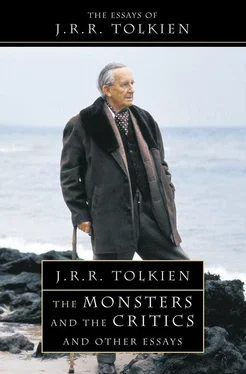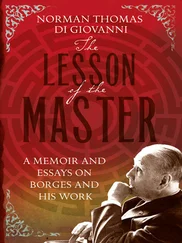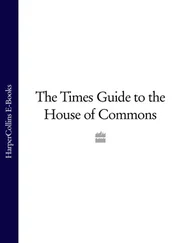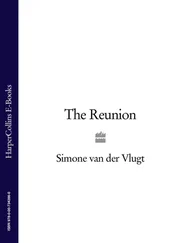Of course it is not here maintained – very much the contrary – that the poet was ignorant of theological heaven, or of the Christian use of heofon as the equivalent of caelum in Scripture: only that this use was of intention (if not in practice quite rigidly) excluded from a poem dealing with the pagan past. There is one clear exception in lines 186 ff: wel bið þœm þe mot œfter deaðdœge Drihten secean, ond to Fœder fœþmum freoðo wilnian. If this, and the passage in which it occurs, is genuine – descends, that is, without addition or alteration from the poet who wrote Beowulf as a whole – and is not, as, I believe, a later expansion, then the point is not destroyed. For the passage remains still definitely an aside, an exclamation of the Christian author, who knew about heaven, and expressly denied such knowledge to the Danes. The characters within the poem do not understand heaven, or have hope of it. They refer to hell – an originally pagan word. 33Beowulf predicts it as the destiny of Unferth and Grendel. Even the noble monotheist Hrothgar – so he is drawn, quite apart from the question of the genuineness of the bulk of his sermon from 1724–60 – refers to no heavenly bliss. The reward of virtue which he foretells for Beowulf is that his dom shall live awa to ealdre, a fortune also bestowed upon Sigurd in Norse (that his name œ mun uppi ). This idea of lasting dom is, as we have seen, capable of being christianized; but in Beowulf it is not christianized, probably deliberately, when the characters are speaking in their proper persons, or their actual thoughts are reported.
The author, it is true, says of Beowulf that him of hreðre gewat sawol secean soðfœstra dom. What precise theological view he held concerning the souls of the just heathen we need not here inquire. He does not tell us, saying simply that Beowulf’s spirit departed to whatever judgement awaits such just men, though we may take it that this comment implies that it was not destined to the fiery hell of punishment, being reckoned among the good. There is in any case here no doubt of the transmutation of words originally pagan. soðfœstra dom could by itself have meant simply the ‘esteem of the true-judging’, that dom which Beowulf as a young man had declared to be the prime motive of noble conduct; but here combined with gewat secean it must mean either the glory that belongs (in eternity) to the just, or the judgement of God upon the just. Yet Beowulf himself, expressing his own opinion, though troubled by dark doubts, and later declaring his conscience clear, thinks at the end only of his barrow and memorial among men, of his childlessness, and of Wiglaf the sole survivor of his kindred, to whom be bequeaths his arms. His funeral is not Christian, and his reward is the recognized virtue of his kingship and the hopeless sorrow of his people.
The relation of the Christian and heathen thought and diction in Beowulf has often been misconceived. So far from being a man so simple or so confused that he muddled Christianity with Germanic paganism, the author probably drew or attempted to draw distinctions, and to represent moods and attitudes of characters conceived dramatically as living in a noble but heathen past. Though there are one or two special problems concerning the tradition of the poem and the possibility that it has here and there suffered later unauthentic retouching, 34we cannot speak in general either of confusion (in one poet’s mind or in the mind of a whole period), or of patch-work revision producing confusion. More sense can be made of the poem, if we start rather with the hypothesis, not in itself unlikely, that the poet tried to do something definite and difficult, which had some reason and thought behind it, though his execution may not have been entirely successful.
The strongest argument that the actual language of the poem is not in general the product either of stupidity or accident is to be found in the fact that we can observe differentiation. We can, that is, in this matter of philosophy and religious sentiment distinguish, for instance: ( a ) the poet as narrator and commentator; (b) Beowulf; and (c) Hrothgar. Such differentiation would not be achieved by a man himself confused in mind, and still less by later random editing. The kind of thing that accident contrives is illustrated by drihten wereda , ‘lord of hosts’, a familiar Christian expression, which appears in line 2186, plainly as an alteration of drihten Wedera ‘lord of the Geats’. This alteration is obviously due to some man, the actual scribe of the line or some predecessor, more familiar with Dominus Deus Sabaoth than with Hrethel and the Weder-Geatish house. But no one, I think, has ventured to ascribe this confusion to the author.
That such differentiation does occur, I do not attempt here to prove by analysis of all the relevant lines of the poem. I leave the matter to those who care to go through the text, only insisting that it is essential to pay closer attention than has usually been paid to the circumstances in which the references to religion, Fate, or mythological matters each appear, and to distinguish in particular those things which are said in oratio recta by one of the characters, or are reported as being said or thought by them. It will then be seen that the narrating and commenting poet obviously stands apart. But the two characters who do most of the speaking, Beowulf and Hrothgar, are also quite distinct. Hrothgar is consistently portrayed as a wise and noble monotheist, modelled largely it has been suggested in the text on the Old Testament patriarchs and kings; he refers all things to the favour of God, and never omits explicit thanks for mercies. Beowulf refers sparingly to God, except as the arbiter of critical events, and then principally as Metod , in which the idea of God approaches nearest to the old Fate. We have in Beowulf’s language little differentiation of God and Fate. For instance, he says gœð a wyrd swa hio scel and immediately continues that dryhten holds the balance in his combat (441); or again he definitely equates wyrd and metod (2526 f.). 35It is Beowulf who says wyrd oft nereð unfœgne eorl, þonne his ellen deah (immediately after calling the sun beacen Godes ), which contrasts with the poet’s own comment on the man who escaped the dragon (2291): swa mœg unfœge eaðe gedigean wean ond wrœcsið, se ðe Wealdendes hyldo gehealdeþ . Beowulf only twice explicitly thanks God or acknowledges His help: in lines 1658–61, where he acknowledges God’s protection and the favour of ylda Waldend in his combat under the water; in his last speech, where he thanks Frean Wuldurcyninge … ecum Dryhtne for all the treasure, and for helping him to win it for his people. Usually he makes no such references. He ascribes his conquest of the nicors to luck – hwœþre me gesœlde , 570 ff. (compare the similar words used of Sigemund, 890). In his account to Hygelac his only explanation of his preservation in the water-den is nœs ic fœge þa gyt (2141). He does not allude to God at all in this report.
Beowulf knows, of course, of hell and judgement: he speaks of it to Unferth; he declares that Grendel shall abide miclan domes and the judgement of scir metod ; and finally in his last examination of conscience he says that Waldend fira cannot accuse him of morðorbealo maga. But the crimes which he claims to have avoided are closely paralleled in the heathen Völuspá , where the grim hall, Náströndu á , contains especially menn meinsvara ok morðvarga (perjurers and murderers).
Читать дальше












